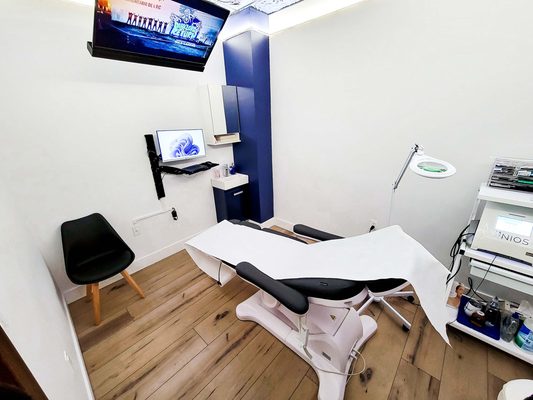

Pregnancy is a wonderful time, but there are challenges to overcome. Besides the morning sickness (yay) and food cravings (nice), physical changes can be also very hard to bear. One of the unexpected changes women experience during pregnancy is the undesired growth of hair. When pregnant, women produce more estrogen that prolongs the hair growth phase (anagen). In this case women can experience thicker, fuller hair (can’t say no to that!). But due to the rising androgen hormone levels, women can also undergo increased hair growth in all different places on the skin. Whether it’s new facial hair (hello mustache), or increased hair in other areas (face, belly, back), a pregnant woman can feel frustrated and confused about these changes.

Those who are into long-term solutions and would like to tackle these ‘problems’ with electrolysis (the only FDA approved permanent hair removal method) might wonder: Is electrolysis safe during pregnancy? What are the options and side effects? These are important considerations, as every choice taken during this period can inevitably impact both you and your baby.
At Nios Spa, we realize how vital it is for you to feel confident and nurtured at times like these. This article will therefore guide you through the essential facts of electrolysis and pregnancy, embracing the safety measures and suggestions of the best practical ways to remove your unwanted hair so that you feel like the hot mom on the soccer field that you are!
IS ELECTROLYSIS SAFE DURING PREGNANCY?
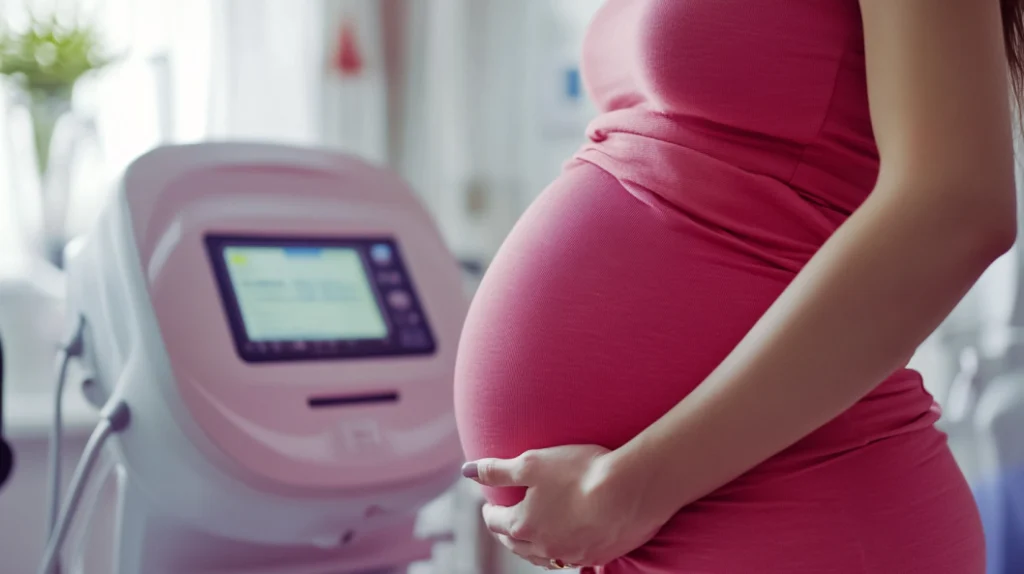
Electrolysis can permanently remove hair since it uses an electrical current on hair follicles. Among the effective and safe methods, electrolysis is considered a suitable option during pregnancy. Nevertheless, the matter of whether electrolysis is safe during pregnancy still brings about new variables that need to be attended to with proper care.
The primary concern most people have with pregnancy and electrolysis is the idea of potential impact of electrical currents on the developing fetus. There is no such research that directly links the electrolysis treatment to fetal damage, but medical doctors often suggest their patients take it easy, especially in the area of their abdomen. This is because this is the time when fetal development starts and it would be better to take extra care to prevent unnecessary risks.
Pregnancy comes with many surprises—some adorable, some… not so much (looking at you, unexpected back fuzz). Thanks to a surge in estrogen and androgens, you might notice hair popping up in new places like your face, belly, or even your back. While this extra fuzz often disappears on its own, the urge to deal with it ASAP is understandable.
Before booking an electrolysis session, it’s crucial to chat with your doctor and a certified electrologist to ensure it’s the right choice for you. Understanding the connection between electrolysis hair removal and pregnancy is what enables you to make choices while putting safety and well-being as the top priority.
WHICH METHOD TO CHOOSE FOR ELECTROLYSIS DURING PREGNANCY?

Electrolysis offers hair removal through three fundamental methods:
For the moms-to-be, thermolysis is typically the go-to since it relies on heat instead of electrical currents, which could pose a risk to the baby. No matter the method, it’s best to keep treatments small and localized during pregnancy so as to keep the dosage to the lowest value possible. Not too bad right? Because let’s be real, you’ve probably already got enough on your plate (and in your belly).
Medical practitioners specializing in this form of treatment will only use the technology if they can fine-tune the settings to their patients’ greatest safety and comfort.
WHEN CAN TREATMENTS BE RECEIVED AND WHICH AREAS CAN BE TREATED?
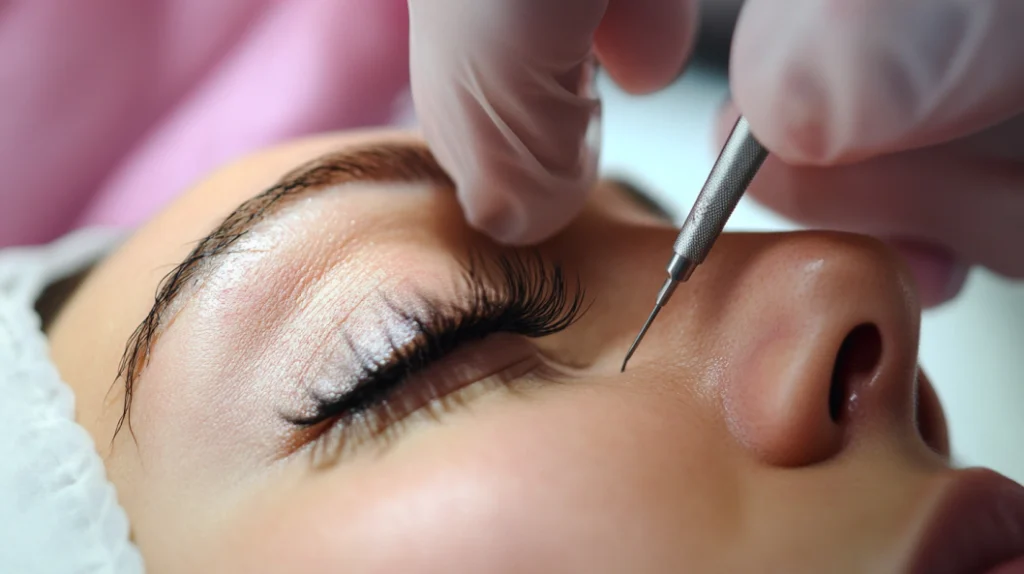
Even though electrolysis on face during pregnancy is known to be safe, you need to observe some precautions:
Do not treat the areas near the abdomen muscles or breasts because these regions are very close to the baby and could pose unnecessary concerns. Instead, deal with parts such as the face, known for the growth of unwanted hair that comes up most of the time anyways.
IS ELECTROLYSIS DURING PREGNANCY PERMANENT?

One of the main reasons ladies prefer electrolysis as their hair removal method is its permanent hair removal capability. This effect can be noted even during pregnancy. Electrolysis also works by pinpointing and destroying the hair follicle, which basically prevents hair regrowth in the treated areas.
However, it is vital to realize that the increased hair growth many women have during pregnancy is commonly short-term (it luckily won’t stay for years). Hormonal fluctuations, specifically the soaring of both estrogen and androgens, can shake off the dormant hair follicles, resulting in the eruption of new or thicker hair. However, this pregnancy-related hair usually disappears naturally within six to twelve months of giving birth.
Electrolysis is a perfect way to eliminate hair you don’t want during pregnancy. Still, some ladies prefer to wait until they are ready for delivery, to have an extra safe pregnancy. By postponing the treatment, they can see if their postnatal hormones fix the issue without any help. The right decision directly reflects individual interests and therapy with an expert.
IS ELECTROLYSIS PAINFUL DURING PREGNANCY?

Pregnancy often heightens sensitivity to pain, making some procedures feel more uncomfortable than usual. Electrolysis, a process that involves inserting a fine probe into each hair follicle to target its root, can cause a mild stinging or tingling sensation during treatment.
For pregnant women, this discomfort can be amplified by increased blood flow and hormonal changes that affect nerve sensitivity. Fortunately, licensed electrologists are trained to adjust the machine’s settings to ensure a gentler experience. Additionally, pregnancy-safe numbing creams can be applied to further reduce discomfort, but it’s important to get your doctor’s approval before using any topical products.
If you’re considering electrolysis during pregnancy, openly discussing concerns about pain with your electrologist is key. They can tailor the treatment to your needs, helping to ensure that the procedure is as comfortable as possible.
OTHER METHODS FOR HAIR REMOVAL
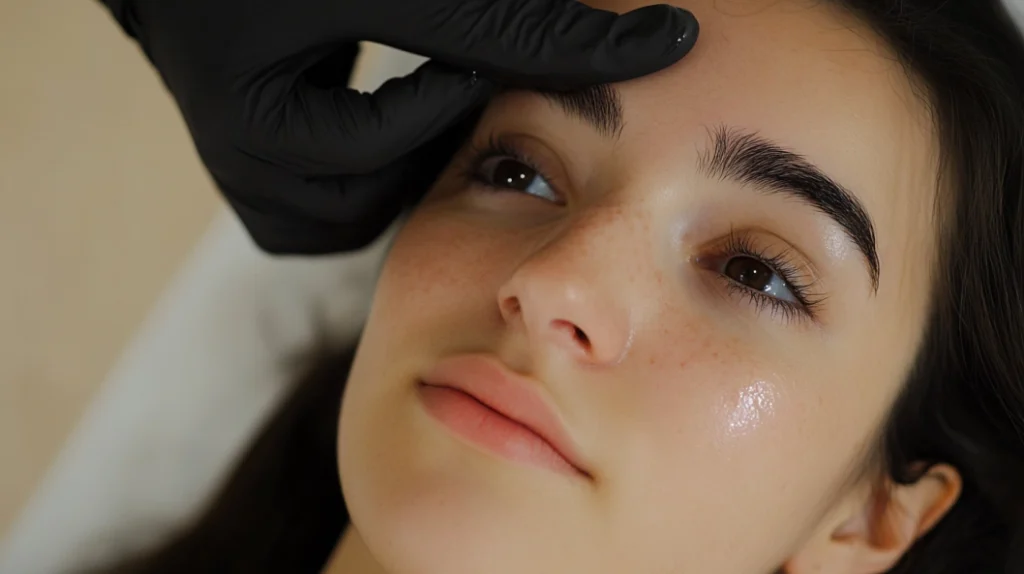
If you’re unsure about electrolysis during pregnancy or prefer to explore alternatives, several options are available:
| Method | Advantages | Disadvantages |
|---|---|---|
| Shaving | Quick and safe | Requires frequent maintenance |
| Waxing | Effective for larger areas | Can irritate sensitive pregnancy skin |
| Depilatory Creams | Easy to use | Contains chemicals that may cause allergic reactions |
| Threading/Tweezing | Ideal for small areas like eyebrows | Time-consuming for larger areas |
| Laser Hair Removal | Long-lasting results | Not recommended during pregnancy due to safety concerns |
For expectant mothers postponing electrolysis, options like shaving, waxing, threading, or depilatory creams offer alternatives. Shaving is safe but requires frequent upkeep while waxing lasts longer and may irritate sensitive skin. Threading suits small areas but is time-consuming for larger ones, and depilatory creams need caution due to potential allergic reactions. Laser hair removal, though effective, is generally not recommended during pregnancy. Choose what aligns with your comfort and safety.
LASER HAIR REMOVAL DURING PREGNANCY
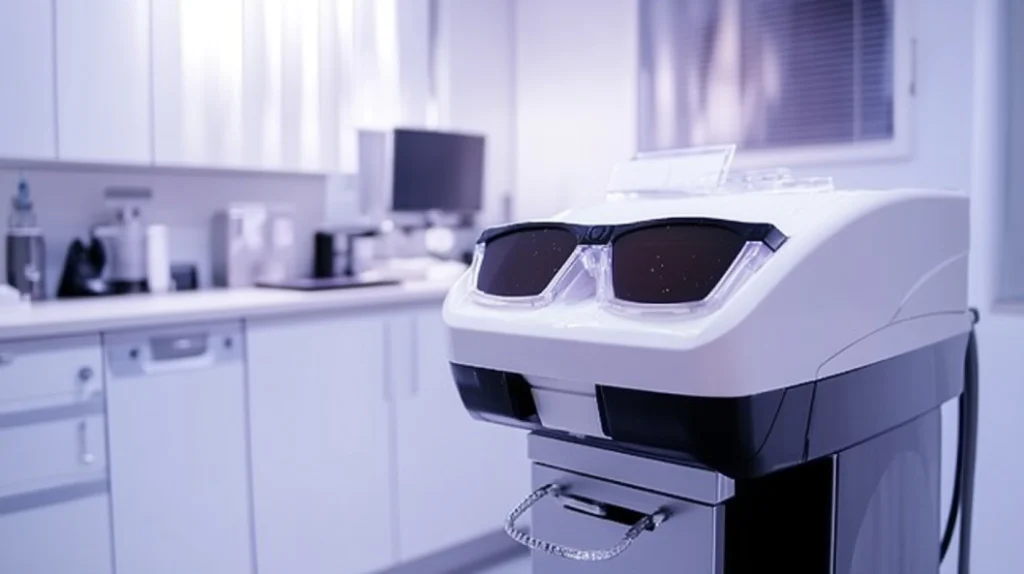
As commonly asked, some people may pose the question, “Is laser hair removal safe during pregnancy?”. Women feel it could be dangerous to the fetus or do harm in any way. While electrolysis is a method that uses an electric ray to conquer the hair follicles, the laser removal procedure uses a focused beam of radiation that can penetrate the hair follicles. The safety of laser hair removal during pregnancy has not been proven due to a lack of clinical studies.
It is the opinion of many medical professionals that laser hair removal should not be done during pregnancy. However, hormonal changes may also be a factor that reduces the effectiveness of laser treatments, as new hair growth may occur after sessions. These reasons prompt one to wait until the baby is born to have the treatment.
CONCERNS WITH HAIR REMOVAL DURING PREGNANCY

Pregnancy-related issues are the first to take into account when selecting a hair removal method to be used:
One method you can use is to ask your doctor and a qualified professional about both of your worries so that you can make a decision that best suits your safety and well-being.
ELECTROLYSIS DURING PREGNANCY BY NIOS SPA

So, still thinking about the question, is electrolysis safe for pregnant women? At Nios Spa, we provide effective, safe, and individualized hair removal treatments for women, including pregnant ones. Our licensed electrologists are trained to cater to the special needs of pregnant women (special electrolysis pregnancy at your service!), while at the same time ensuring your comfort and safety throughout the process.
We reckon that pregnancy may come with uncomfortable things that were not planned but be sure that we offer full support for your emotional well-being, as well as other facilities to you that you may need. Be it pregnancy electrolysis or other creative ways, we are always here to support you and answer any questions you may have.
It should be kept in mind that pregnancy is only temporary, and many of the observed changes, like increased hair growth, will naturally disappear after pregnancy. Until then, you can stay safe and comfortable and let the experts show you the best options that suit your requirements.